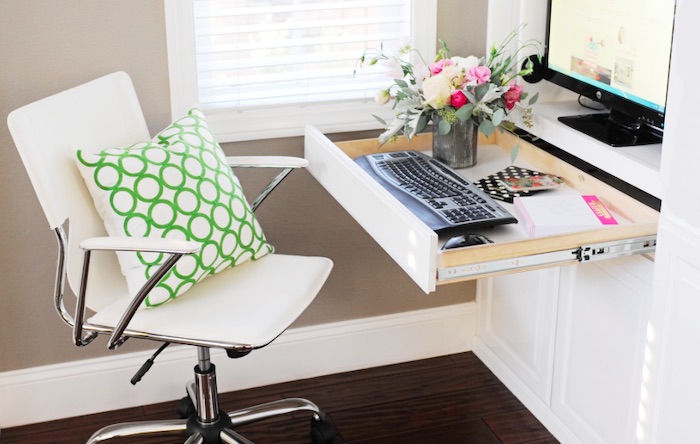
Transitioning from working at the office to working at home can be difficult, especially when you’ve never done your job remotely. You may be distracted, uncomfortable or too comfortable, and lack the focus to be as effective as you are at your desk or cubicle.
To help you figure out how to stay productive at home and maintain the same level of focus as you had in-office, check out our tips and tricks to working from home below.
Working Remotely Tips:
**Click to auto-scroll by section

Create a Comfortable Work From Home Office Space
The beauty of being a remote worker is that you can work from just about any room in your house, apartment or condo, as long as it is set up properly.
Creating a productive workspace for home is very similar to the office. Here are some ways to design a workspace that will help keep you focused and productive while working at home:
1. Consider the needs of your job.
Before deciding on a workspace, consider the type of work you’ll be doing. Do you need an extra monitor for web design or coding? Does your job require a drafting table? A printer? Is a laptop sufficient, or will you need the space for a desktop computer?
All of these things can help determine the amount of space you’ll need, and whether or not you’ll need to be in close proximity to an outlet.
HIPPA-Compliance for Healthcare Workers and Operators: If you work with sensitive personal information such as healthcare, in order to stay HIPPA-compliant, you cannot allow patient information to be seen or accessed by anyone other than yourself. Make sure you set up a compliant workspace in your home.
***For more information about HIPPA compliance, please contact your HR department ***.
2. Designate a work from home office space.
Most importantly, your new remote workspace should be dedicated to just that – doing work. For those who live in smaller spaces or who don’t usually work from home, it might not be possible to dedicate a work from home office space indefinitely – and that’s ok!
If your work-from-home situation is only temporary, it’s probably not necessary to set up an entire home office. However, it is important to create a space that you can temporarily dedicate to your new remote work arrangement.
If you don’t have access to WiFi and are only able to connect to the internet via a wired connection like an Ethernet cable, take the length of the cord and the location of your modem into account when selecting your workspace.
3. Use what you have on-hand.
If you’re not able to transform an entire room into your new home office, get creative with what you do have! Especially during times of social distancing, there’s no need to run out to the store and purchase a brand new desk and desk chair.
The kitchen or dining room table is often a great place to work since the chairs and table are typically at an acceptable height for working on a computer. The kitchen or dining room table can double as a desk during the day, and a place for meals once you’re off the clock.
Of course, if at all possible, it’s ideal to not have to set up your workspace fresh every morning, but if that’s all you can make work, don’t worry! As long as you keep it dedicated to your job during working hours, a temporary area will be just fine.
4. Make it comfortable.
When you’re going to be sitting at a computer or makeshift desk for hours on end, it’s incredibly important that you’re comfortable. An uncomfortable work environment will make it easy to get distracted and off-task.
5. Stay organized.
If you work with a lot of paperwork, make sure you have a neat and organized place to keep them in your workspace. A filing box or a desktop filer can keep your papers organized and easily transported to and from the office on the days that you do go in.
Additional Tips For Your New Workspace:
- Don’t just post up on your couch. It won’t keep you focused, and it will hurt your posture.
- Don’t feel like you have to stick to a conventional office space. Whether you live in a studio or a 17-room mansion, you can work from any room as long as you set it up correctly.
- Make a playlist and listen to music. Our attention is way too easily drawn to a movie or tv show, so it’s best to keep the TV off.
- Clutter decreases productivity, so banish the clutter from your workspace.
- Working from home saves you the time you would usually spend commuting. Take that time to declutter and clean up around your home.
- Clutter has also been linked to anxiety, stress, and depression. When you are required to work from home, letting the clutter build up around you coupled with the reduced social interaction you have with colleagues can get you down.
- Dishwashers: Two hours.
- Washing Machines: Between 30 and 118 minutes.
- Dryers: 30 minutes to one hour.
🧑💻 Have trouble finding things in your home office? Check out these office organization ideas.

Stick to Your Schedule
If your company requires you to punch a digital time clock, sticking to a schedule shouldn’t be a challenge since you have set online hours. If you’re paid hourly, it’s likely your company does require you to clock in while you’re working remotely.
For salaried individuals who either don’t work set hours or who aren’t required to prove that they were working during their scheduled hours with time clock software, it can be especially easy to allow distractions to get the best of you. We’ll get to reducing distractions next.
You may be sleeping in a little longer since you don’t have to get up early in order to commute to work, too. Sleeping in a little bit can help us feel more well-rested, and therefore more focused. But be sure to give yourself enough time to get mentally prepared for several hours of online meetings and spreadsheets.
Change Out of Your PJs
An added benefit to working at home is not having to get buttoned up or put on a uniform before heading out the door. But that also doesn’t mean that it’s a good idea to sit around in your pajamas all day, either.
Working in your jammies can make you feel extra lazy or tired because your brain associates your pajamas with going to sleep. Getting ready in the morning helps signal to our brains that it’s time to get up and get going. So even though you’re not actually going into the office, ditch the pj’s for sweats and a comfy tee-shirt.
Keep Your Set Schedule and Breaks
Even if you’re not clocking in every day, keep the same hours that you normally keep! Your colleagues or team members are used to having you around, and they’ll be expecting you to be available. You also don’t want to change it up too much and deviate from your normal routine, since that kind of change can tempt us off the path of productivity. Changing the hours you work might not only affect your family members and colleagues but it also can disturb your work-life balance.
Use Timers for Focus Work
You can stay productive while working from home by designating intervals for “in-the-zone work.” Setting timers help you control distracting urges like to get up and adjust your work space, check out the fridge another time, or scroll through your phone again.
The one simple rule for when the timer is running is stay on task. It’s recommended to work for 90 minutes and then get up to enjoy a break. Limit the time spent on Slack, Zoom and/or emails during this time.
If you struggle to sit still and focus for long periods of time, start with a timer for 30 minutes of distraction-free work. Your focus is like a muscle. The more you use it, the stronger it gets.
Breaks keep your mind sharp while working from home and are crucial for focus in the first place so don’t “power through” unless you absolutely need to. Your eyes, brain, and body need a break from sitting and staring at a computer.
Get up and Stretch
Physical activity gives your thinking mind a break which makes it a great solution for how to be productive working remotely!
Download a fitness app that tracks your steps and alerts you when it’s time to stand up. Take a walk on your lunch break to get some fresh air and to help feel less isolated. Get out the yoga mat and do some yoga and meditation when it’s time to move.
No matter what you decide to do, any physical activity will increase blood oxygen to your brain, which has been proven to make our brains perform better. Getting your blood pumping will help get you through that dreaded midday slump.
Got broken exercise equipment? WE TAKE THAT ❯

Reduce Clutter & Distractions to Boost Productivity
As we mentioned earlier, there’s no place for clutter in your new workspace. If household junk and clutter are part of your daily life, you know how distracting clutter is.
Clutter reduces productivity. It triggers anxiety and stress, which no one needs while trying to stay focused and productive while working from home.
One of the best organization tips for working from home is to clean up the clutter around your home! That could be anything from broken furniture, appliances, electronics or exercise equipment, to boxes and bags of random junk. The most important thing about cleaning up clutter is to not allow it to just wind up in a closet, garage or attic.
Getting rid of items that you don’t use or haven’t used for years is incredibly important to decluttering both your home and your mind. A cluttered mind is not a productive mind, and a cluttered area is not a productive workspace.

Get rid of noisy or broken appliances.
Getting rid of unnecessary distractions could even mean a noisy appliance like a dishwasher, washing machine or dryer. This is especially important if you are the kind of person – like most of us are – who likes to catch up on dishes or laundry during breaks while you’re working from home. In that case, a noisy appliance can turn out to be very distracting.
Appliance cycle times, on average:
Imagine how distracting a squeaky, thumping or whirring appliance could be for the length of an entire cycle.
Now is a great time to upgrade your old, distracting appliance! Since you don’t want to add to the clutter, it’s important to get rid of the old appliance that you replace.
LoadUp offers fast and easy appliance removal services that won’t interrupt your work from home schedule. Our Loaders will be in and out in no time flat. Since we offer guaranteed, upfront pricing, our Loaders will only visit your home once, unlike most other junk removal companies with time-consuming on-site estimates, which ultimately defeats the purpose of getting rid of something to increase your productivity.
Reducing contact? We do outdoor pickups. LEARN MORE ❯
Eat Real Meals to Reduce Mindless Snacking

You’re home. You have access to the kitchen. Use it! Eating balanced meals is a great way to increase productivity.
We are not productive when we are hungry. But at the same time, it’s important to not accidentally overdo it. Eating a rich meal could make it more tempting to close your eyes for a few minutes on the couch, which could accidentally lead to several hours before you know it.
Utilize Technology for Communication Between Co-Workers

Communicating can be more challenging than we realize. It’s easy to talk to a coworker face-to-face when you can just roll over to their cubicle, take a brief walk to their office or catch up with them at the water cooler.
Although there are tons of different ways to communicate with coworkers from home, including email, Slack and conference calls, it can often be difficult to be as effective at communicating when it’s not in-person.
Make sure to be clear in your communications with your coworkers. Remember, tone isn’t well-conveyed through email or chat, and can be misconstrued if you aren’t crystal clear. If it’s easier to communicate face-to-face, try a video call or video chat platform such as Google Hangouts, GoToMeet or, of course, Zoom.
Enjoy Your Extra Time

It’s not time off, but when you cut out your daily commute, you have more free time to enjoy. Try out work from home tips such as setting timers for focus work, creating a comfortable but energizing home workspace, and taking care of your health to bring your best business foot forward and get the productivity boost you’re looking for.
According to the U.S. Census, the average daily commute to work for Americans is about 26 minutes one-way. That adds up to almost an hour per day, and for those who work five days a week, that’s 5 hours of free time you’ve gained.
In larger cities, work commutes can take between one and two hours. That’s two to four hours a day, or 10 to 20 hours a week that you get back from your usual workday. Enjoy it!
Decluttering your Work Space? BOOK A PICKUP ❯
Related Articles from the Trash Talk Blog:

